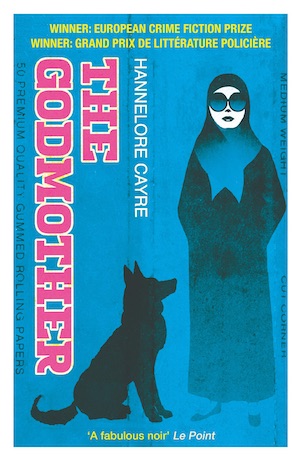
Written by Hannelore Cayre, translated by Stephanie Smee — This fantastic novel, first published in France only two years ago, has already won the European Crime Fiction Prize and the Grand Prix de Literature Policiere. Isabelle Huppert will star in the film adaptation coming next year.
Written as a memoir, The Godmother tells the story of Madame Patience Portefeux, a 53 year old widow employed by the French police to act as an interpreter who briefly becomes involved in the drug trade when a shipment of cannabis falls into her lap. That story would be interesting enough by itself, but what makes the book stand out is how the author uses the plot to explore the immigrant experience, to tell a love story and to celebrate female resilience and resourcefulness.
There is a refreshing frankness about Mme Portefeux’s account of her actions that makes her sympathetic. She is vain, prideful, somewhat aloof and self-absorbed, but also funny and honest, and since the novel is written in her voice the pages fly by.
Her account of her brief time as a wholesaler of a very potent strain of cannabis is interspersed with recollections of formative experiences in her past. We learn about her parents – her father from French Tunisia and her mother from Jewish Vienna – and how their immigrant status kept them apart from mainstream society. It was a situation exploited by her father in his smuggling business. We also learn about her blissful marriage and how her husband’s unexpected death broke her heart, and the struggle she had acting as a mother to her young daughters. Gradually a picture is built up of a woman in middle-age adrift in life, no longer able to afford the finer things in life she had been accustomed to, and who feels the usual constraints of civic life do not apply to her. In this way, it feels totally believable when she takes her decision to exploit the opportunity given to her.
Mme Portefeux began her career with the police translating cases in court involving Arabic speakers. Impressed with her diligence and efficiency, and crucially unaware she was frequently advising the accused in what to say rather than interpreting the judge’s questions, she is promoted to translating wire taps during drugs investigations. When she realises that one of the criminals in a gang that is being monitored by the police is actually the son of her mother’s favourite carer, she uses her knowledge of the police operation to warn him to dump his load of cannabis. As the members of the gang squabble amongst themselves over how to recover the drugs, she swoops in to claim them for herself. And so the career of The Godmother is born.
As to how her story ends, I will leave you to read the book to find out. The author’s choice to write the novel as a memoir and her protagonist’s compelling voice help to create an intimate story where I felt as if Mme Portefeux was talking to me alone and that together we were planning her crime. I’ve never read a novel quite like The Godmother, which is both rich with human detail but also feels as light as a breakfast croissant. It is a delightful surprise and deserves all the accolades which have already come its way.
French crime fiction is full of curve balls, and you can find more of them here.
Print
Old Street Publishing
£8.99
CFL Rating: 5 Stars









I enjoyed the book but could not pick up on the significance of the short story she tells at the end, what did you think it was referring to?